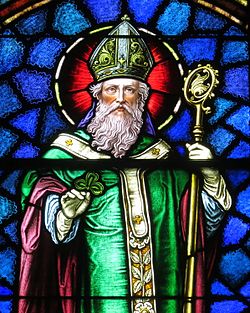Saint Patrick Quotes
About Author
Saint Patrick (Latin: Pātricius; Irish: Pádraig Irish pronunciation: [ˈpˠɑːɾˠɪɟ] or Irish pronunciation: [ˈpˠaːd̪ˠɾˠəɟ]; Welsh: Padrig) was a fifth-century Romano-British Christian missionary and bishop in Ireland. Known as the "Apostle of Ireland", he is the primary patron saint of Ireland, the other patron saints being Brigid of Kildare and Columba. He is also the patron saint of Nigeria. Patrick was never formally canonised by the Catholic Church, having lived before the current laws were established for such matters. He is venerated as a saint in the Catholic Church, the Lutheran Church, the Church of Ireland (part of the Anglican Communion), and in the Eastern Orthodox Church, where he is regarded as equal-to-the-apostles and Enlightener of Ireland.
The dates of Patrick's life cannot be fixed with certainty, but there is general agreement that he was active as a missionary in Ireland during the fifth century. A recent biography on Patrick shows a late fourth-century date for the saint is not impossible. According to tradition dating from the early Middle Ages, Patrick was the first bishop of Armagh and Primate of Ireland, and is credited with bringing Christianity to Ireland (despite evidence of some earlier Christian presence on the island), and converting Ireland from paganism in the process.
According to Patrick's autobiographical Confessio, when he was about sixteen, he was captured by Irish pirates from his home in Britain and taken as a slave to Ireland. He writes that he lived there for six years as an animal herder before escaping and returning to his family. After becoming a cleric, he returned to spread Christianity in northern and western Ireland. In later life, he served as a bishop, but little is known about where he worked. By the seventh century, he had already come to be revered as the patron saint of Ireland.
Saint Patrick's Day, considered his feast day, is observed on 17 March, the supposed date of his death. It is celebrated in Ireland and among the Irish diaspora as a religious and cultural holiday. In the Catholic Church in Ireland, it is both a solemnity and a holy day of obligation.
The dates of Patrick's life cannot be fixed with certainty, but there is general agreement that he was active as a missionary in Ireland during the fifth century. A recent biography on Patrick shows a late fourth-century date for the saint is not impossible. According to tradition dating from the early Middle Ages, Patrick was the first bishop of Armagh and Primate of Ireland, and is credited with bringing Christianity to Ireland (despite evidence of some earlier Christian presence on the island), and converting Ireland from paganism in the process.
According to Patrick's autobiographical Confessio, when he was about sixteen, he was captured by Irish pirates from his home in Britain and taken as a slave to Ireland. He writes that he lived there for six years as an animal herder before escaping and returning to his family. After becoming a cleric, he returned to spread Christianity in northern and western Ireland. In later life, he served as a bishop, but little is known about where he worked. By the seventh century, he had already come to be revered as the patron saint of Ireland.
Saint Patrick's Day, considered his feast day, is observed on 17 March, the supposed date of his death. It is celebrated in Ireland and among the Irish diaspora as a religious and cultural holiday. In the Catholic Church in Ireland, it is both a solemnity and a holy day of obligation.
